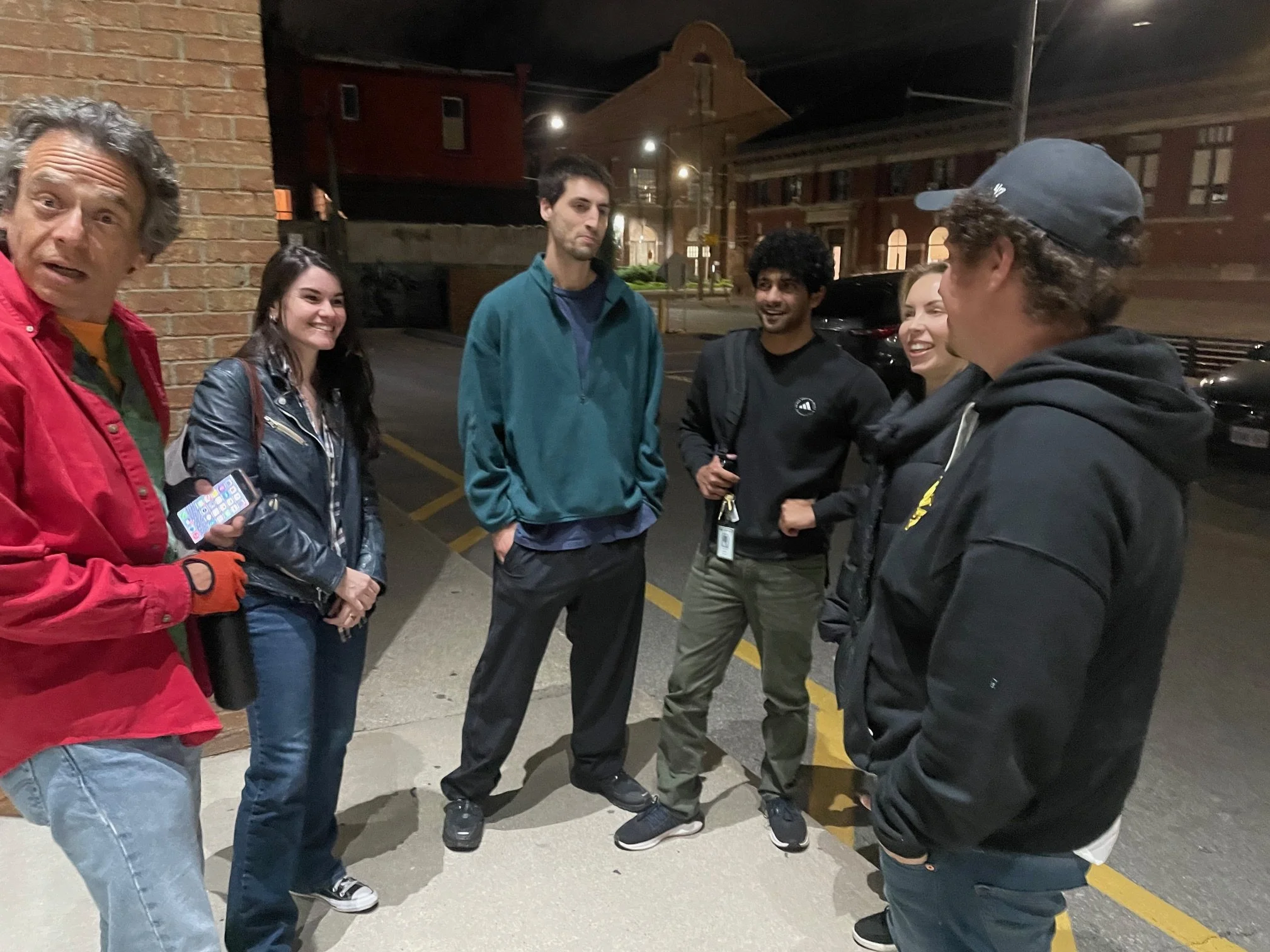Bertolt Brecht
/The Bertolt Brecht Cultural Centre in Havana, Cuba website states:
‘Brecht was one of the greatest playwrights of the 20th century. He was also a director, poet, intellectual, politically committed to the cause of liberating the world from the exploitation of man by man.
Brecht was a great communist intellectual, a multi-talented artist.
He gave all his strength, concentrating on the problems of humanity, to showing - through his work - the path of liberation of man from class exploitation and war. Brecht, committed to the struggle, displayed unique courage, the courage to place politics in art, politics as an integral element of art and vice-versa.’
He wanted the theatre to teach and for the audience to be wide awake and thinking. He was against theatre that lulled the audience into a passive state.
To do this he developed a style of writing, a style of acting and a style of stage production - brand new forms for the theatre. It is now called epic theatre.
‘The development of social content is an absolutely essential precondition for the productive development of artistic forms. Unless it adapts itself to this development of content and takes orders from it, any formal innovation will remain wholly unfruitful.’ Brecht writes in his notes On Rhymeless Verse with Irregular Verbs.
‘When I read Marx's Capital’, a note by Brecht reveals, ‘I understood my plays.’
Born in Augsburg, Germany on February 10, 1898, Brecht was an ambulance driver during the First World War. He began writing in the 1920’s with a total of 31 plays produced and over 2,000 poems written.
He left Germany when Hitler came to power in 1933 and moved to Prague, Zurich, Paris and then lived for six years in Denmark. With financial help from his friend and fellow exile, Lion Feuchtwanger, Brecht was able to go to the United States in 1941 and remained there until 1947.
His works were burned during the Nazi book burnings of 1933.
In response to the invasion of Poland by the German armies of Adolf Hitler in 1939, Brecht wrote one of his best known plays Mother Courage.
The preface to the Ralph Manheim/John Willett Collected Plays states: ‘Mother Courage, with its theme of the devastating effects of a European war and the blindness of anyone hoping to profit by it, is said to have been written in a month; judging by the almost complete absence of drafts or any other evidence of preliminary studies, it must have been an exceptionally direct piece of inspiration.’
One of the greatest plays of the 20th century, Mother Courage had a landmark production in Winnipeg at the Manitoba Theatre Centre in 1964. Directed by John Hirsch, the founder of MTC, with Zoe Caldwell in the title role along with other famous Canadian actors Frances Hyland, Douglas Rain, William Needles, Len Cariou and Martha Henry.
The opening night of that production climaxed with five curtain calls for Caldwell and the Free Press calling it ‘a Mother Courage to remember and cherish.’ The Globe & Mail wrote ‘In achieving the scale of this remarkable stage work, it establishes the scale of the Manitoba Theatre Centre.’
Since the play was written there have been surprisingly few productions in Canada or elsewhere in the English-speaking world.
Helene Weigel, Brecht’s wife and the co-founder of the Berliner Ensemble, gave the first German performance of Mother Courage at Berlin’s Deutsches Theater in 1949, and after more than fifty years, her portrayal of the resourceful peddler who makes a living from the Thirty Years War remains definitive.
Examples of a lack of understanding of content leading to changing the form were shown in two recent revivals. The 2006 New York production and the 2009 National Theatre production in London. For both productions a translation was used by Pulitzer Prize and Tony Award winning author Tony Kushner. New York Magazine’s Jeremy McCarter called the translation ‘unnecessarily vulgar and simple.’
About the New York production, starring Meryl Streep, Ben Brantley wrote in The New York Times ‘the production was lacking in cohesion and integrity to Brecht’s masterpiece.’ The director, ‘emphasizes the gallows vaudeville of a play that has an all-too-reverberant relevance in these days of war’.
Writing about the London production, starring Fiona Shaw, Charles Spencer, theatre reviewer for The Telegraph, called it a ‘rock-and-roll circus.’ Spencer continues saying ‘this version was gimmicky and meaningless’ citing the leading actress entering the stage wearing sunglasses.
In Praise of Communism is a song from Brecht’s 1931 play The Mother.
It is reasonable. You can grasp it. It's simple.
You're no exploiter, so you'll understand.
It is good for you. Look into it.
Stupid men call it stupid, and the dirty call it dirty.
It is against dirt and against stupidity.
The exploiters call it a crime.
But we know:
It is the end of all crime.
It is not madness but
The end of madness.
It is not chaos,
But order.
It is the simple thing
That's hard to do.
Here are excerpts from several of his poems
Questions from a Worker Who Reads
Who built Thebes of the seven gates? In the books you will read the names of Kings. Did the Kings haul up the lumps of rocks?
Demands for Freedom
Even the narrowest minds In which peace is harboured Are more welcome to the arts than the art lover Who is also a lover of the art of war
United Front Song
Comrade, there’s a place for you. Take your stand in the worker’s united front For you are a worker too.
In Praise of Learning
Hungry man, reach for the book: It is a weapon. You must take over the leadership!
Praise of the Party
Who do you think is the Party? Does it sit in a big house with a switchboard? Are all its decisions unknown, all its thoughts wrapped in secrecy? Who is it? We are it.
To the Students of the Worker’s and Peasant’s Faculty
So there you sit. And how much blood was shed That you might sit there. Do such stories bore you? Well, don’t forget that others sat before you Who later sat on people. Keep your head!
During his time in the U.S. Brecht associated with a community of exiles, such as Fritz Lang, Hanns Eisler, Joseph Roth, Oskar Maria Graf, Anna Seghers, Lion Feuchtwanger, as well as Heinrich and Thomas Mann. It was a community of exiles who had joined together in their effort to combat Nazism.
Many of them were members of Exilliteratur - the name for works of German literature written in the German diaspora by refugee authors who fled from Nazi Germany.
He had a close relationship with the great German actor Peter Lorre. Lorre had played the title role of Galy Gay in Brecht’s play Man is Man in a 1931 production in Germany. He was one of Brecht's favorite actors and Lorre, in turn, admired and respected Brecht writing in his biography, ‘Brecht was one of the greatest writers of our time’.
He developed a close relationship with Charlie Chaplin while in the United States. Brecht later wrote that Chaplin ‘would in many ways come closer to the epic theatre than to the dramatic theatre's requirements.’ They discussed Chaplin's Monsieur Verdoux project and it’s possible Brecht influenced the film.
Brecht was looking for work in Hollywood and didn’t get much of it. He writes in his poem Hollywood
Every day, to earn my daily bread I go to the market where lies are bought Hopefully I take up my place among the sellers
One job he did get was to co-write the screenplay for the Fritz Lang film Hangmen Also Die! which was loosely based on the 1942 assassination of Reinhard Heydrich, the Nazi Deputy and Heinrich Himmler's right-hand man. Hanns Eisler was nominated for an Academy Award for his musical score. The collaboration of three prominent refugees from Nazi Germany – Lang, Brecht and Eisler – is an example of the influence this generation of German exiles had on American culture.
While in Los Angeles, Brecht was brought before the The House Committee on Un-American Activities (HUAC). The clever Brecht asked for a translator to be with him even though his English was excellent. The translator provided a buffer between him and Senator Joseph McCarthy and the other committee members asking questions. It gave Brecht time to think of good answers.
An example of this is when the Committee read out Brecht’s famous poem In Praise of Learning and then McCarthy arrogantly demanded, ‘Did you write this poem!?’ Brecht calmly replied, ‘No, the one I wrote was in German.’
Brecht testified before the Committee on October 30, 1947 and the next day he returned to Europe. Shortly after his return to East Germany in 1947 he founded the Berliner Ensemble. Brecht received the Stalin Peace Prize in 1954.
Some of Bertolt Brecht’s best known plays are: Life of Galileo, Mother Courage and Her Children, The Good Person of Szechwan, The Resistible Rise of Arturo Ui, The Caucasian Chalk Circle, Fear and Misery of the Third Reich, The Mother, Man is Man.
The Caucasian Chalk Circle is a play about how to discuss; how to solve problems; and who deserves what.
Members of two collective farms in the Caucasus are holding a meeting to discuss what to do with a valley now that it has been liberated from the Nazi army. Characters address each other as Comrade and one group is the Collective Goat Farm Rosa Luxemburg.
The Girl Tractorist: “As the poet Mayakovsky said, ‘The home of the Soviet people shall be the home of Reason!’”
One farm wants to raise goats and the other to grow fruit and the discussion sorts out what is most useful for the development of the society. A play is presented based on an old Chinese story called the Chalk Circle to help shine light on how to come to the best decision.
In the Prologue The Singer says: ‘We hope you’ll find that old poetry can sound well in the shadow of new tractors.’
Simply put, the story of The Caucasian Chalk Circle tells of a Princess who abandons her child to save her own life and a peasant woman who takes up the child and raises it under difficult conditions. At the end of the play a decision has to be made as to who is the rightful mother. A circle is drawn, the child is put in the centre and the women are instructed to each take an arm and pull. The idea being whoever pulls the child out of the circle claims the child. The Princess pulls, but the peasant woman doesn’t as she won’t harm the child she has raised and loves. The peasant woman is declared the rightful mother.
With The Singer singing the last four lines of the play Brecht makes his point -
That what there is shall go to those who are good for it, Children to the motherly, that they prosper, Carts to good drivers, that they be driven well, The valley to the waterers, that it yield fruit.
Bertolt Brecht died in Berlin on August 14, 1956. At the time of his death, Brecht was planning a play in response to Samuel Becket's Waiting for Godot.
Sources
The Caucasian Chalk Circle, English version by Eric Bentley. University of Minnesota Press.
Compact Poets, Bertolt Brecht, translation by H. R. Hays. Chatto and Windus, London.
Bertolt Brecht, Poems and Songs from the Plays, edited and translated by John Willett. Methuen.
Bertolt Brecht, Poems 1913 – 1956, John Willett, Ralph Manheim, Eric Fried. Methuen.
Brecht, Poems on the Theatre, translated by John Berger and Anna Bostick. Scorpion Press.








